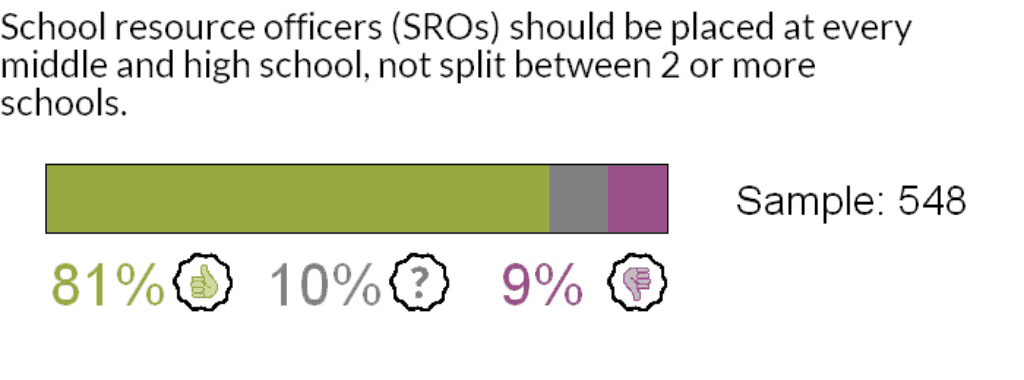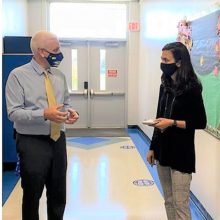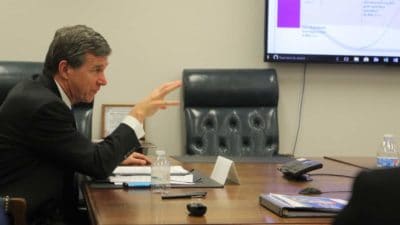Protecting the well-being of North Carolina students was a key theme throughout the People’s Session. Following the school shooting in Parkland, the House Select Committee on School Safety was created to study and recommend ways to make the state’s schools and students safer. Since then, a variety of commissions and summits have studied what it will take to support the physical, social, and behavioral health of North Carolina’s students.
House Select Committee
The House Select Committee on School Safety met multiple times throughout 2018 and visited schools to study how to improve the well-being of students and schools across the state. The committee also split into two working groups with one focused on physical safety (school building structure, school resource officers) and the other focused on student health (school support staff such as nurses, school psychologists, etc.). In March, House Speaker Moore reauthorized the committee for this legislative session.
For more on our coverage of this committee’s work, see these articles:
- House Select Committee on School Safety hears from experts during first meeting
- Subcommittee on student health: More school psychologists needed to keep schools safe
- Legislators push for more training and respect for school resource officers
- Subcommittee on student health offers six school safety recommendations
- School safety working group wants specialized training for school resource officers
- House Committee approves school safety measures including anonymous tip line expansion
House Bill 76, titled “School Safety Omnibus,” incorporates recommendations from the House Select Committee on School Safety, including threat assessment teams for each school and school resource officer training. HB 76 moved successfully through the House K-12 education committee in late February, was passed by the full House in early March, and is now sitting in the Senate rules committee.
HB 76 gives many policymaking and oversight responsibilities to the Center for Safer Schools, under the Department of Public Instruction. The bill would do the following:
- Require the Center for Safer Schools to create policies for threat assessment teams which should consist of “persons with expertise in counseling, instruction, school administration, and law enforcement” to handle emergency situations.
- Require every school to do vulnerability assessments each year with a vulnerability assessment tool that the Center for Safer Schools is tasked with creating.
- Require the Center for Safer Schools to do a variety of other things, including: provide training and professional development around school safety for public school employees, facilitate public-private partnerships to promote school safety, assist law enforcement officers in active shooter response drills, and help to develop training for school resource officers.
- Create peer-to-peer student support programs for schools grades sixth and higher, managed by school counselors, that help students with things like “conflict resolution, general health and wellness, and mentoring.”
Student health
Similar to the two work groups of the House Select Committee, topics related to school safety in the People’s Session fell into two categories: those pertaining to the issue of student health, and those pertaining to the issue of physical safety of school buildings.
One core issue related to student health is that North Carolina’s ratios for school support personnel — including nurses, psychologists, social workers, and counselors — are far below the nationally recommended ratios. Here’s where North Carolina stands on each of those roles.
- Counselors: The nationally recommended ratio for school counselors is 1:250 and North Carolina’s ratio is 1:367.
- Nurses: The nationally recommended ratio for school nurses is one per school, or about one per 750 students. North Carolina’s school nurse ratio ranges from 1:313 to 1:2,724. Less than half (41 percent) of school nurses in North Carolina serve just one school — others serve up to six schools at once. Twenty-two percent of school nurses serve three or more schools.
- Psychologists: The nationally recommended ratio for school psychologists is 1:500-700 students and North Carolina’s ratio is 1:2,083 students.
- Social workers: The nationally recommended ratio for school social workers is 1:250, and North Carolina’s ratio is 1:1,427.
Increasing school support staff to meet the national recommended ratios was one of the most-supported statements in the People’s Session, with 93% of participants agreeing.

There was slightly less support for ensuring that all K-12 schools have at least one dedicated school nurse, with 79% agreeing.
“In order for schools to best reach all students, and not allow bullying, violence, etc. to slip through the cracks, the state needs to fully fund counselors, mental health specialists, psychologists, and social workers.” — Cleveland County

“There is a severe lack of funding for guidance counselors, exceptional children staff, and their support. There are too few people and too many students. Then, after identification, there is a lack of counselors, mental health facilities, and social services staff for these kids.” — Brunswick County
Physical safety
The physical safety and security of students and educators on school campuses is another aspect of school safety. School resource officers (SROs) are law enforcement officers who are assigned to work within the school setting. The latest numbers from DPI estimate that there are 1,200 SROs assigned to schools across the state, with some assigned to multiple schools. For reference, North Carolina has about 2,500 public schools.
During the People’s Session, 81% of participants agreed that school resource officers should be placed at every middle and high school rather than assigned to multiple schools.

The following statement, submitted by a participant in the People’s Session, also received strong support with 82% of participants agreeing that schools should be required to submit school safety procedures for all times of the school day to local law enforcement.

There was less support for the following statement, also submitted by a participant, that says security devices should be installed in every K-12 classroom that would impede doorway entrance during an emergency situation.

“More cameras at all entrances. Make it harder for people to enter the school. Once a person leaves the campus they should show their ID to get back on campus. Have police patrol the campus more often on foot and in their cars. Have volunteers whose ID’s have been checked to patrol campuses. The schools that are in the country need this also, not just cities.” — Halifax County
The People’s Verdict
People’s Session participants overwhelmingly supported policies that would increase school support staff, such as school nurses and school psychologists, and school resource officers. Opinions were more mixed on specific issues related to the physical safety of school buildings, such as physical security devices installed to lock classroom doors.
Safe schools start with a healthy environment. All schools should be mandated to teach social skills, anti-bullying programs, and effective communication strategies in times of stress to all students daily. The school culture should be one of respect for others not just authority and mentally-healthful activities that promote compassion and empathy for all students and staff. — An educator in New Hanover County
Some of the legislative items related to school safety, including aspects of the School Safety Omnibus bill, may appear as budget items rather than being signed into law. EdNC will continue to report on the budget process as it progresses.
For a closer look at what people said about school safety and other key education issues, read our full People’s Session report.
To join weekly conversations with Reach NC Voices about policy issues facing North Carolina, leave your contact information below




